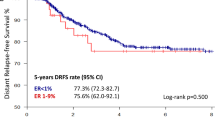Abstract
Primary chemotherapy in operable breast invasive carcinoma enables tumour reduction and conservative surgery. In order to search for one or more biological factors capable of predicting tumour behaviour under primary chemotherapy, and subsequent patient survival, an immunohistochemical study was performed with specific antibodies to p53, c-erbB-2 (Her-2/neu), Mib1 (antiKi-67), pS2, GST pi, oestrogen receptors (ERs) and progesterone receptors (PRs). Core biopsies, obtained before primary chemotherapy, were available from a series of 128 breast invasive carcinomas treated between January 1985 and April 1989, with a median follow-up of 93.3 months. Univariate statistical analysis showed that negative ER detection by immunohistochemistry (IHC) was highly correlated with chemosensitivity (P = 0.001). A high percentage of Mib1-positive tumour cells (> 40%), as well as initial tumour size less than 4 cm, were also correlated with tumour responsiveness to chemotherapy (P = 0.009 and P = 0.03). By multivariate analysis IHC-ER, Mib1 and initial tumour size were independent predictors, the last parameter being the most important. Concerning subsequent patient survival, c-erbB-2 overexpression, as detected by IHC, was significant with respect to overall survival (OS) (P = 0.0006), disease-free interval (DFI) (P = 0.03) and metastasis-free interval (MFI) (P = 0.008) by univariate analysis. Furthermore, c-erbB-2 was the major independent prognostic factor for OS and MFI by multivariate analysis.
This is a preview of subscription content, access via your institution
Access options
Subscribe to this journal
Receive 24 print issues and online access
$259.00 per year
only $10.79 per issue
Buy this article
- Purchase on Springer Link
- Instant access to full article PDF
Prices may be subject to local taxes which are calculated during checkout
Similar content being viewed by others
Author information
Authors and Affiliations
Rights and permissions
About this article
Cite this article
MacGrogan, G., Mauriac, L., Durand, M. et al. Primary chemotherapy in breast invasive carcinoma: predictive value of the immunohistochemical detection of hormonal receptors, p53, c-erbB-2, MiB1, pS2 and GST pi. Br J Cancer 74, 1458–1465 (1996). https://doi.org/10.1038/bjc.1996.565
Issue Date:
DOI: https://doi.org/10.1038/bjc.1996.565
This article is cited by
-
Is Ki-67 Really Useful as a Predictor for Response to Neoadjuvant Chemotherapy in Locally Advanced Breast Cancer?
Indian Journal of Surgical Oncology (2023)
-
Locally Advanced Breast Cancer: Response Evaluation to Neoadjuvant Chemotherapy by Clinico-Histopathological Parameters and Molecular Imaging
Indian Journal of Surgical Oncology (2023)
-
Expression of cell cycle markers is predictive of the response to primary systemic therapy of locally advanced breast cancer
Virchows Archiv (2016)
-
Different Methods of Pretreatment Ki-67 Labeling Index Evaluation in Core Biopsies of Breast Cancer Patients Treated with Neoadjuvant Chemotherapy and Their Relation to Response to Therapy
Pathology & Oncology Research (2015)
-
Evaluation and Validation of Neo-Adjuvant Response Index (NRI) and It’s Correlation with Various Predictive Biomarkers and RECIST in Locally Advanced Breast Cancer
Indian Journal of Surgical Oncology (2014)



